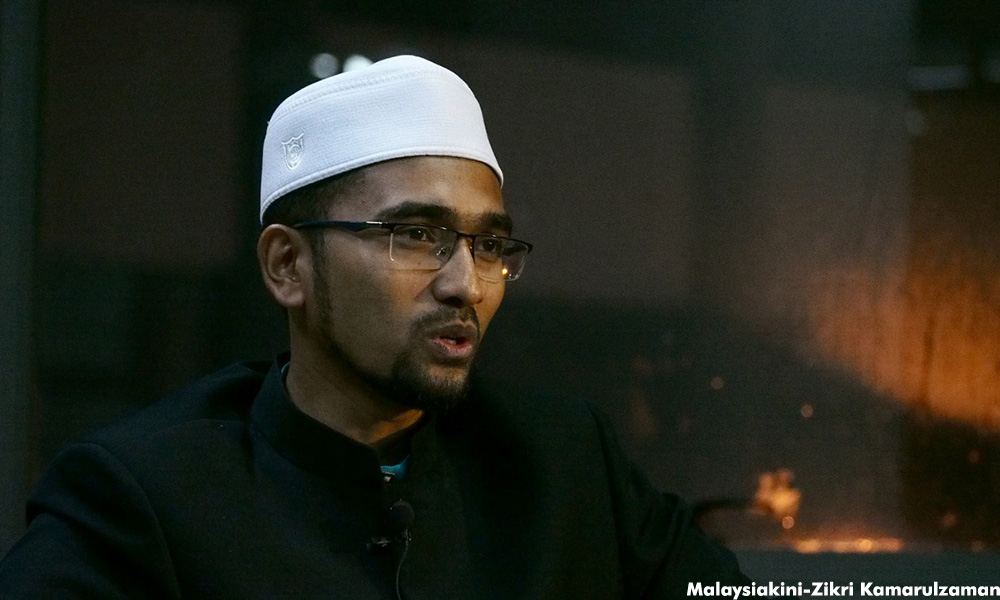
Two experts on syariah have questioned the planned implementation and purpose of PAS president Abdul Hadi Awang's bill to amend the syariah penal laws.
Former Terengganu mufti Ismail Yahya and scholar Rozaimi Ramle instead proposed an alternative method to strengthening syariah courts and Islamic law, by either having a unified court system for both syariah and civil law, or Islamising the civil court.
Hadi wants to amend the Syariah Courts (Criminal Jurisdiction) Act (Act 355) to increase the punishment cap for syariah offences, to RM100,000 fine, 30 years in jail, and 100 strokes of the cane.
Speaking at a PKR-linked forum on the proposed Act 355 amendments, Rozaimi questioned among others, the lack of details on the need to increase punishments.
 "I don't see the justification to implement 30 years' jail and the RM100,000 fine... This must be justified by the one who proposed it," Rozaimi (photo) said at the forum organised by Invoke in Kuala Lumpur last night.
"I don't see the justification to implement 30 years' jail and the RM100,000 fine... This must be justified by the one who proposed it," Rozaimi (photo) said at the forum organised by Invoke in Kuala Lumpur last night.
He said the increased jail time and fines were definitely not hudud (law based on the Quran and hadith), but was instead ijtihad (law based on legal reasoning).
"What is hudud is the lashes, but even then (the amendments only state) 100 strokes in general when it should be 100 strokes for zina, 80 strokes for qazaf (accusing someone of zina), and 40 strokes for drinking alcohol," Rozaimi said.
Hadi and PAS maintain that the amendments are not hudud law, but Rozaimi claimed that on the ceramah circuit, many proponents of the bill say that it is hudud.
As for Ismail, one lingering question is whether amendments to Act 355 would truly ensure justice and fairness, as well as make Islam more enticing to others.
He cited a historic example of how the Caliph Ali had once accused a Jew of stealing his armour, but lost the case in a syariah court due to insufficient evidence.
"The Jew was so moved at how fair the Islamic court was that he returned the armour and embraced Islam," Ismail said.
He warned that even if the law was just, bad implementation could turn people away from Islam.
'Hadi's bill not the only way'
Both Ismail and Rozaimi also questioned whether the government would actually take up Hadi's bill, and disputed that it was the only way to strengthen syariah courts.
Ismail - who was also the former chief syariah judge of Terengganu - said there were many other aspects about the syariah court that need improvement, including its administration and operations.
One example he said, was how in some states, such as the Federal Territories, certain syariah offences only had one avenue of appeal if a case starts in the Syariah High Court - whereas civil courts would allow two avenues of appeal, regardless of whether a case is heard before a magistrate or by a High Court.
 Ismail (photo) also said that due to each state having control over its own syariah courts, some Muslims were able to avoid abiding by court orders - for example to pay alimony - by moving to a different state that does not have a reciprocal agreement with the sentencing state.
Ismail (photo) also said that due to each state having control over its own syariah courts, some Muslims were able to avoid abiding by court orders - for example to pay alimony - by moving to a different state that does not have a reciprocal agreement with the sentencing state.
He therefore proposed that in order to uphold justice, the syariah and civil courts be unified under one system, with an overarching federal law, instead of each state having its own Islamic laws.
Asked how this would work, Ismail said there would still be a separation between civil and syariah law, but that it would be under the same court system.
However, when a Muslim and a non-Muslim were tried together, the law applied to the non-Muslim would depend on the circumstances.
Citing the Indira Gandhi case - whose husband converted to Islam and unilaterally converted their children whom he took with him - Ismail said since the marriage was under civil law, then the case must be tried under civil law as well.
But in cases such as zina, he said, this would be up for interpretation.
Scholars at a disagreement
Rozaimi had earlier noted that scholars are at a disagreement as to whether Islamic law applies to non-Muslims, with some arguing that when it comes to "personal offences", a non-Muslim is subject only to the laws of their own religion or civil law.
However, Rozaimi argued that in the interest of strengthening Islamic law, the opposite interpretation should be considered, so that both a Muslim and non-Muslim face the law when committing an offence.
He proposed that this be done by either expanding the authority of syariah courts to non-Muslims, or to Islamise civil courts by enacting a Hudud Act that can be implemented in a civil court.
Currently, the Federal Constitution states that syariah laws only have jurisprudence over Muslims.
The forum stirred heated questioning after it ended, with audience members questioning how syariah law would protect women in cases of rape, or non-Muslims in cases of theft.
On the matter of rape, Rozaimi said while it is classified as zina under Islamic jurisprudence, there is no need for four witnesses to prove a crime.
Instead, he said, two witnesses or evidence such as a medical report would be sufficient to prove the crime and punish the offender.
Ismail explained that while a non-Muslim can't act as a witness in cases of theft, his testimony can still be used, and that if it is stronger than the accused's defence, then such testimony can lead to prosecution.
He also said that Muslims would still be punished, regardless of whether they steal from Muslims or non-Muslims.-Mkini



No comments:
Post a Comment
Note: Only a member of this blog may post a comment.